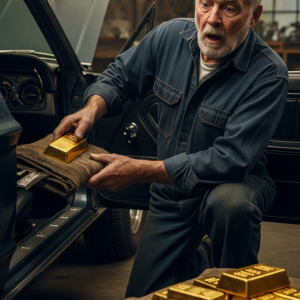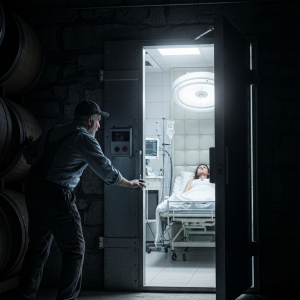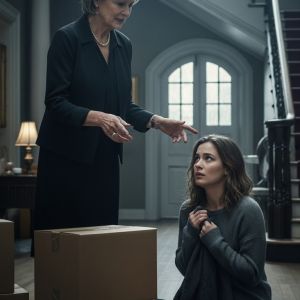The three Henderson siblings were products of the same soil, but they had grown in vastly different directions. Mark, the eldest, had fled the family’s agricultural roots for the steel and glass canyons of Wall Street, becoming a sharp-suited investment banker who spoke in acronyms and quarterly earnings. Karen, the middle child, had traded the open fields for the airtight logic of a courtroom, becoming a formidable corporate lawyer in Los Angeles.
And then there was David, the youngest. David had stayed. To his siblings, he was a curiosity, a gentle disappointment. He had chosen to work the earth, his hands calloused, his face weathered by the Arizona sun. They saw his choice not as a noble continuation of their heritage, but as a profound lack of ambition, a failure of imagination.
Their father, a man who had built a respectable but aging agricultural supply company from the ground up, had been the glue that held their disparate worlds together. Now, six months after his passing, that glue had dissolved, leaving only the brittle residue of sibling rivalry and condescension.
David had always been the quiet one, but in the years leading up to his father’s death, he had grown even more withdrawn. His siblings heard snippets of his life from their father. “David’s having another one of his meetings with the county zoning board,” their father would say, a strange, proud twinkle in his eye. Mark and Karen would exchange a look over the phone. “Probably in trouble over water rights again,” Mark would mutter. “He never could handle the paperwork.”
They never understood the long hours their father spent with David, not at the bustling company headquarters, but out on the most desolate patch of the family’s holdings: a 500-acre tract of sun-scorched, barren desert known colloquially as “The Devil’s Anvil.” They would walk the arid, cracked earth for hours.
David remembered the last walk vividly. His father had stopped, shielding his eyes and looking up at the relentless, white-hot sun. “They’re all so busy harvesting last year’s crops, son,” the old man had said, his voice raspy. “They forget that the real work is planting the seeds for the next century. This… this is where the real harvest is going to be.” David had simply nodded, the secret they shared hanging between them, as vast and silent as the desert itself.
The law office of Mr. Abernathy was a stuffy, wood-paneled room that smelled of old paper and older money. Mark and Karen sat on one side of the gleaming mahogany table, their tailored city clothes looking out of place and yet completely dominant. They exuded an aura of impatient, barely contained avarice. David sat opposite them, his work boots looking enormous and out of place on the plush oriental rug, his silence a stark contrast to their restless energy.
Mr. Abernathy, a man who had served their father for forty years, cleared his throat and began to read the will. The language was formal, but the intent was clear. The family business, “Henderson Agricultural Supply,” its warehouses, its inventory, and its controlling shares, were to be divided equally between Mark and Karen.
“It is my hope,” the lawyer read in a dry monotone, “that their modern expertise will breathe new life into the company I built.” Mark and Karen exchanged a brief, triumphant glance. It was exactly as they’d expected. They were the heirs to the empire.
Mr. Abernathy adjusted his glasses and continued. “And to my youngest son, David, whose heart has always been tied to the land itself, I leave the entirety of the family’s undeveloped property in the southern county, the parcel known as ‘The Devil’s Anvil,’ consisting of 500 acres, more or less.”
The air left the room in a quiet hiss of anticlimax. Mark broke the silence with a short, sharp laugh—a sound of pure, unadulterated pity. He leaned over and clapped David on the shoulder, a gesture that was meant to seem brotherly but was purely patronizing.
“Well, there you have it, little brother,” he said with a wide, cruel smirk. “Don’t worry. Maybe you can farm some cactus out there. Or rocks. It’s fitting, in a way. A farmer should have his land, right?”
Karen, ever the lawyer, added her own polished barb, her voice smooth as silk. “It’s a lovely sentimental gesture, really. Dad always knew how to give each of us exactly what we were suited for. We’ll handle the business, David. You enjoy your… scenery.” The insult was as clear as it was dismissive. They had inherited the assets; he had inherited a tax liability.
David’s reaction was not what they expected. There was no flash of anger, no flicker of disappointment, no wounded pride. He simply sat there, his expression placid, as if he were watching a moderately interesting weather report. He absorbed their mockery with a calm that was deeply unsettling.
As Mark and Karen immediately launched into a hushed but excited discussion about “leveraging assets,” “restructuring management,” and “phasing out the old guard,” David reached down beside his chair. He lifted a thick, heavy, black three-ring binder and placed it on the mahogany table.
He didn’t slam it down. He placed it with a soft, deliberate thud. The sound was not loud, but it had a weight, a finality that cut through their financial jargon like a knife. The room fell silent. Mark and Karen stopped talking, their attention drawn to the imposing, mysterious object. Even Mr. Abernathy looked up from his papers, his curiosity piqued.
David didn’t open the binder. He just rested his calloused hand on top of it, the silence stretching, becoming taut and electric. He let his siblings sit with their victory, letting the taste of it turn stale in their mouths as they stared at the binder, a physical manifestation of a secret they were not privy to. Their world of fast-paced, abstract transactions had just run into a wall of slow, tangible reality.
Finally, David looked up, his gaze sweeping over his two highly educated, profoundly ignorant siblings. His voice, when he spoke, was quiet, but it commanded the attention of the entire room.
“You’re right, Karen,” he began, his tone even. “Dad always did know how to give each of us what we were suited for. He gave you two the past. He gave me the future.”
With a slow, deliberate movement, he opened the heavy binder. The first page was a title sheet, printed in a clean, corporate font. At the top was a sleek, modern logo of a sunburst over a barren landscape. The title read: “PROJECT SOLITUDE. A 400-MEGAWATT PHOTOVOLTAIC POWER PLANT. THE DEVIL’S ANVIL, ARIZONA.”
Mark and Karen stared, their expressions of smug pity beginning to curdle into confusion. Mark let out a small, disbelieving laugh. “A solar farm? David, you need tens of millions for something like that. You need permits that take years. This is just a fantasy.”
David said nothing. He simply turned the page. It was a summary document, filled with bullet points. “Five years of hydrological surveys,” he said, tapping one point. “Four years of environmental impact studies. Three years of county and state zoning applications. Eighteen months of federal land use negotiations.” He looked up at them. “All permits have been approved and finalized as of last month.”
The color was beginning to drain from Karen’s face. As a lawyer, she understood the staggering amount of work and capital that represented. That wasn’t a fantasy; it was a mountain of bureaucratic labor.
David turned another page, revealing the centerpiece, the document that had consumed the last year of his life. It was a thick contract, emblazoned with a familiar, colorful logo.
“And this,” David said, his voice dropping slightly, “is the twenty-year, fixed-rate Power Purchase Agreement, signed two weeks ago, to sell one hundred percent of Project Solitude’s energy output to Google for their new regional data center, which, by the way, is being built on the adjacent parcel of land.”
He slid the binder across the table. Mark and Karen leaned forward, their eyes scanning the signature page, their minds struggling to process the numbers—the megawatts, the price per kilowatt-hour, the astronomical total value of the contract. It was a figure that dwarfed the annual revenue of their father’s entire company.
As if on cue, David’s phone began to vibrate. He glanced at the screen, then looked at his siblings. “Excuse me. I have to take this.” He answered and put the call on speakerphone. A crisp, energetic voice filled the silent room.
“David! It’s Sarah Jenkins from Google Global Infrastructure,” the voice said. “I’m calling with the good news. The board gave final approval this morning. Your project was officially fast-tracked. Congratulations, David. You’re now at the helm of the single largest renewable energy deal in the history of this state.”
The destruction of Mark and Karen’s arrogance was a quiet, brutal thing. It wasn’t a shouting match; it was the silent, crushing weight of realization. The “worthless” piece of land they had mocked was the most valuable asset in the entire family portfolio, by a factor of a hundred. Their “inheritance” was a nostalgic relic. David’s was an empire.
They stared at their younger brother, the slow, unambitious farmer. They saw him now for what he was: a patient, visionary strategist who had been playing a completely different game, on a timeline they couldn’t even comprehend. And the worst part, the part that truly hollowed them out, was the realization of their father’s role in it all.
David let that sink in before delivering the final, devastating blow. He reached back into his briefcase and pulled out one more file, this one much slimmer. He opened it to reveal a simple funding agreement, signed five years prior.
“Dad knew the agricultural supply business was slowly dying,” David said softly. “He saw the future. He knew you two wouldn’t. So he made a choice.”
He pushed the agreement towards them. The sole investor, the one who had funded the millions of dollars in legal fees, engineering studies, and permit applications for the last five years, was their father. David was the project lead, but their dad was the silent, visionary partner.
“This was his real succession plan,” David finished. “He didn’t leave me a piece of land. He and I built this, together. This was the legacy he wanted to leave.”
Mark and Karen finally understood. They hadn’t been chosen. They had been placated. Their father had given them the past to keep them busy, while he and David quietly built the future. The shame was a physical, burning sensation. They hadn’t just misjudged their brother; they had fundamentally misunderstood their own father.
In the weeks that followed, the full scale of David’s new reality became clear. He was no longer David the farmer; he was David Henderson, President and CEO of Solitude Energy Partners, a major new player in the renewable energy sector.
He did not gloat. It wasn’t his nature. He was a man who understood cycles, who knew that the sun that gives life could also burn. He still lived in the same modest ranch house, still drove the same dusty Ford pickup truck, and still found peace walking the land.
Mark and Karen, meanwhile, were facing the grim reality of their inheritance. The agricultural supply company was saddled with debt and facing declining revenues. Their largest local client, a corporate farm, had just been bought out to make way for the expansion of the Google data center campus. Their company’s future looked bleak.
Then, they received a formal request for a meeting. Not from their brother, but from the procurement office of Solitude Energy Partners. David met them in a temporary office trailer on the edge of the construction site, the vast expanse of the future solar farm stretching out behind him.
He was all business, but there was no malice in his eyes. “My project, and the Google campus, will require extensive local services,” he said, pushing a Request for Proposal across the table. “Landscaping, supply logistics, water management. Your company is well-positioned to bid for the contract. It would be the largest in your company’s history.”
The offer hung in the air: an act of profound magnanimity that was also an undeniable assertion of absolute power. He was offering them a lifeline, a chance to make their legacy business profitable again by servicing his new one. He was offering to be their biggest and most important client.
Humbled, and with no other options, they accepted. They were now working for their little brother.
Months later, David stood on a small rise, looking out over a sea of gleaming, blue-black solar panels that stretched to the horizon. They silently drank in the fierce Arizona sun, transforming the “worthless” land into pure, clean energy. He hadn’t just won. He had honored his father’s vision, proving that the greatest strength doesn’t come from the loudest voice or the quickest profit, but from the patient, quiet work of planting seeds for a future you believe in. He was a farmer, through and through. He had just changed his crop from corn to sunlight.




